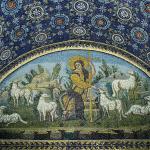
When speaking of the origins of Christian monasticism, most people think about St. Antony the Great, and perhaps, thanks to St. Jerome, St. Paul the Hermit. But there were many other monastic pioneers, many who are unnamed and preceded Antony, and others who were his contemporary, who also helped contribute much to the religious way of life. First among those is St. Pachomius the Great (c. 292 – 348 CE). Monasticism as we tend to think of it has much to do with the way Pachomius established the cenobitic way of life, where ascetics come together to form a proper community, living together, instead of being hermits seeking to live mostly by themselves. Pachomius saw that monks would receive many benefits living and working together, serving each other, instead of living alone, taking care of their personal needs all by themselves. That is, Pachomius promoted the common good, making sure monks realized that they are better together. To do so, he had to teach monks how they should deal with problems in the communal setting, problems which could and would threaten to divide the community and hinder the spiritual development of those within it. He had to take the social dimension into consideration, but he did so in a spiritual way, applying the teachings of Christ to social issues, showing what they implied for the monastic community.
One of the most important messages which Pachomius gave comes directly from Jesus, and it is that we are to care for everyone, to love them, doing what is best for everyone, including those who are deemed to be our enemies. No matter what kind of society we live in, promoting the common good means helping everyone attain the greatest good possible; if we would ignore those we do not like, or those who do not like us, we not be working for the common good, but something far less, and the good which we do and establish will be diminished:
The Lord has ordered us to love our enemies, to bless those who curse us, and to do good to those who persecute us. What danger are we in then, when we hate one another, when we hate our co-members, one with us, sons of God, branches of the true vine, sheep of the spiritual flock gathered by the true shepherd, the Only-Begotten son of God who offered himself in sacrifice for us! The Living Word underwent these sufferings for so great a work, and you, man, hate it through jealousy and vainglory, or avarice, or contempt – things for which the enemy has ensnared you, to make you a stranger to God. What defense will you present before Christ? He will say to you, ‘Inasmuch as you hate your brother I am he whom you hate,’ and you will go off to eternal torment because you are inimical to your brother. As for your brother, he will enter into eternal life because, for Jesus, he humbled himself before you.[1]
We should do what is good for everyone, building everyone up the best we can. We should do so with prudence, doing what we can to make sure people do not abuse the good, and in doing so, circumvent the common good by such abuse. In secular society, especially as within it many, if not most, are not looking out for the common good but their own private good, promoting the common good often means establishing rules and regulations to make sure people within it benefit the most they can; we are not doing people good if we let them embrace grave evils which give them the power to undermine and destroy society. We should not be lured into some sort of libertarian indifference. On the other hand, we should be careful when dealing with those who act in ways we do not like, who, indeed, who do things which are morally unsound, making sure that we give them freedom to act and choose for themselves what they want to do as long as their actions do not represent a grave threat to the common good. That is, we must avoid judging or condemning others, especially as we often do so in order to unjustly prop ourselves up as their betters, looking for honors and accolades for what we have done. All that would do is create undue contention, contention that will threaten the common good, leading people to engage in all kinds of unnecessary conflicts:
My son, never condemn anyone. If you see someone being honored, do not say, ‘He already has received his reward.’ Guard yourself from such a thought, for it is very bad, and God detests the man who has praise only for himself, scorning his brother. The one who says to himself that he is somebody, when he is nothing, is fooling himself. Who can help him in his pride? And when he presents himself after the manner of God, saying, There is no one like me, he will hear his censure without delay. You will go down to hell, you will be thrown in with the dead, rot will spread over you, you will be covered with maggots. As for the man who has acquired humility, he has judged himself, saying that his sins are greater than those of any man. He judges no one and condemns no one. Who are you to judge a servant that is not yours? The Lord certainly raises up anyone who has fallen. Keep watch over your soul, my son, condemn no one, taste all the virtues, and guard them.[2]
Certainly, within a monastic setting, where the community should be focused on the way of love, helping each other, making sure everyone is lifted up, this is an extremely important lesson. Monks easily get set in their own ways, and, because they are trying to do extraordinary things with their lives, find the temptations to vainglory and pride to be constant threats throughout their lives. The key to overcoming vainglory and pride, the key to keeping focused on the common good, then, is to embrace the way of love, a way which must include mercy. We must be slow to anger, slow to judgment and condemnation, even as we must be quick to forgive and help each other. Pachomius was clear, without mercy, without being able to show mercy to others, we will not receive mercy, but if we embrace mercy, we will find God will take the good we have done and add to it grace, grace which will offer us the mercy which we need for all our own personal failures:
My son, be merciful in all things, for it is written, Strive to be presented to God as having come through trial, like a workman who fears no shame. Approach God as one who sows and reaps, and into your granary you will gather God’s goods. Do not pray with much show, in the manner of hypocrites, but give up your whims and do what you do for God, thus acting for your own salvation.[3]
If we show mercy instead of judging others, we honor them and their dignity, and in doing so, demonstrate our own dignity. On the other hand, if we are quick to anger and let it control our actions, so they are unreasonable, our inhumanity to others only demonstrates the way we have departed from our own natural human dignity:
When a brother hurts his word at you, why do you get angry, when become a beast toward him? Do you not remember, then, that Christ died for you? But when your enemy, the devil, whispers to you, you cock your ears in his direction for him to pour in filth; you open your heart to him and absorb the poison he throws your way.[4]
It is easy to see how these exhortations were important because they helped explain that a monastic community cannot thrive if people within them hold grudges against each other. Indeed, these instructions were written down when Pachomius saw such a grudge infecting the monastic community, and so he wisely explained why it needed to end and what, exactly, was expected of everyone if they are to live and work together. They were told to put aside their differences and care for each other. While a monastic community is able to do this in a way secular society cannot, because there are less members in it, and less needs which need to be addressed as a result of having significantly fewer members, we should not be surprised that such communities often fail to live out these ideals. Everyone, including those called to the religious life, is a work in progress; what is key is to accept the core teachings of Christ and to work with them, engage them within the community we find ourselves in, realizing the way those engagements will work out will be determined by the situations in which they are tested. We should try to be non-judgmental, to be merciful, understanding they are not ideals just for those who are religious, but for everyone. As those living in secular society will not have all the disciplines and aids as those living in a monastery will possess, we should of course be more flexible with those living in secular society, even as we should expect their engagements with Christ’s teachings, due to their contextual situation, will produce different results than those living in a monastery. What is important is the ideals are taken to heart, and people strive to follow them the best they can.
[1] St Pachomius, “The Instructions of Saint Pachomius,” in Pachomian Koinonia. Volume Three. Trans. Armand Veilleux (Kalamazoo, MI: Cistercian Publications Inc., 1982), 30 [#37].
[2] St Pachomius, “The Instructions of Saint Pachomius,” 16 [#12].
[3] St Pachomius, “The Instructions of Saint Pachomius,” 20-1 [#21].
[4] St Pachomius, “The Instructions of Saint Pachomius,” 25 [#28].
Stay in touch! Like A Little Bit of Nothing on Facebook.
If you liked what you read, please consider sharing it with your friends and family!
N.B.: While I read comments to moderate them, I rarely respond to them. If I don’t respond to your comment directly, don’t assume I am unthankful for it. I appreciate it. But I want readers to feel free to ask questions, and hopefully, dialogue with each other. I have shared what I wanted to say, though some responses will get a brief reply by me, or, if I find it interesting and something I can engage fully, as the foundation for another post. I have had many posts inspired or improved upon thanks to my readers.
















